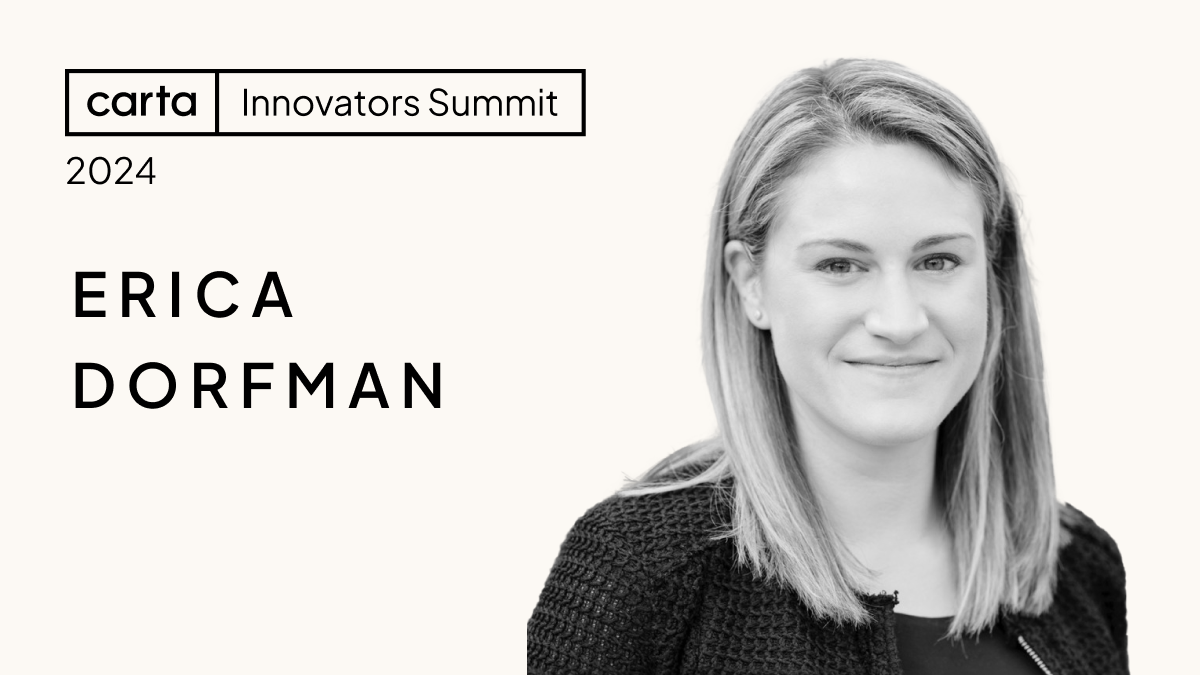Working at a startup can be life-changing. But getting into tech and maintaining a fulfilling, successful career can also be challenging—it requires relentlessly pursuing your interests, building relationships, and taking chances.
That's exactly what Erica Dorfman did. Erica is head of global financial products at Brex, an AI-powered platform that helps finance leaders control spend. Before Brex, Erica worked in traditional finance and transitioned into fintech at SoFi, where she led the capital markets team.
Erica recently joined Carta’s Innovators Summit for a panel on “Building a Meaningful Technical Career in Startups” and sat down with Carta for a deep dive on the subject. Among the topics discussed:
-
Her transition from private equity to fintech
-
Advice for transitioning into product
-
How to manage a technical team

Carta: How did you end up in fintech?
Erica Dorfman: I've always been interested in business and economics, so I went to Columbia and studied economics. Then I went into investment banking because I thought it would be the best way for me to understand finance at a core level.
Working in investment banking at JP Morgan, I pretty quickly realized there's a lot of great things about investment banking, but you can't compel anyone to take action. You could be a complete expert in the space and give great advice, but you’re not in the trenches building the business.
How did these realizations influence your career path?
It made me realize that I wanted to help build a company from the inside, which led me to joining the capital markets team at SoFi.
Once you got into tech, how did your career progress?
I pretty quickly got promoted at SoFi partly because it was the right place and the right time and we were growing like rapid fire—but also because I came with a problem-solving mindset. How should we scale? How do we think about building this team so that we can 10X? Because we're going to 10X based on all the information that I can see, and we're definitely not prepared.
I was there for a few years, and then had the opportunity to join an early-stage company called Tally Technologies, as the CFO/COO. The core business was more oriented around software than SoFi at the time, which was a great experience because I got to be so much closer to what it meant to have engineering and data be the core of what we were building.
What led to your move to Brex?
I had kept in touch with folks at SoFi that ended up being really early employees at Brex, and they recruited me to come over and help build Brex Cash. At first I was hesitant to leave Tally, but I had worked with a lot of the team before and was incredibly impressed with them and with Brex’s founders Henrique (Dubugras) and Pedro (Franceschi).
How did your role at Brex evolve over time?
Like with most startups, I ended up doing a ton of things. I helped with financial partnerships, helped launch our capital markets program, and even worked with Henrique to launch a bank.
Then we did a reorg on the product side and they asked me to come over and lead one of the macro product teams. So that's what I've been doing for the last two-and-a-half years. I lead our global financial products business.
Do you have any advice for people aspiring to get closer to a technical career or make a transition into product?
I think number one is understanding what that really means. There's a sexiness to the notion of being in product, but it can be a pretty grueling role. It's hard building something new and innovative. So do it in an area that you actually find interesting. Because you're going to have to spend a lot of time digging into the product, customer, and market.
I enjoy my job so much because I am a finance nerd and I really enjoy financial products. I love working through system architecture and our payments platform. And that's pretty unique to what I’m helping build.
How do you manage teams with diverse technical skills, especially those outside your expertise?
Managing diverse teams involves setting clear goals and metrics. While I may not have specific technical skills, I focus on the outcomes we're aiming for and hold the team accountable. It's about learning enough about each person on your team’s expertise to ask the right questions and supporting the team's growth in areas where you have expertise.